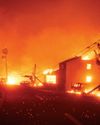CATEGORIES
最新のストーリー

The Strongman of Ecuador
Daniel Noboa's bravado, aggressive policies and alignment with Trumpian politics has positioned him as a formidable figure in Latin America. But his fight to retain the presidency isn't over

CRAIG & PAIGE What Really Happened
Craig Conover and Paige DeSorbo are still not seeing eye-to-eye when it comes to the shocking split.

Chelsea Handler
AS A SIX-TIME NEW YORK TIMES BESTSELLING AUTHOR, CHELSEA HANDLER knows the secret to a successful book is to stay true to herself.

CAMERON'S #METOO MOMENT
Fans have been happy to see Cameron Diaz back onscreen with Jamie Foxx in the spy caper Back in Action.

CHAOS AT THE VIEW
The cohosts of The View are known for their controversial takes.

Life, Love & Her Latest Project: HERSELF
Her new book, I'll Have What She's Having, follows the candid comedian's path to choosing happiness, \"even when it doesn't choose me.\" On the eve of her 50th birthday, she lets Us in on her secrets

The Hottest Cosmetic Procedures of 2025
Top doctors tell us what's buzzing in the world of aesthetic medicine

Kevin's REVENGE DATING!
Playing the field of dreams!

Hugh & Sutton Are Getting Serious
Hugh Jackman and Sutton Foster's romance has only grown stronger since going public

LIAM'S SAD LAST DAYS: DROPPED BY HIS LABEL
The criminal case in the October death of Liam Payne is ongoing, with five people indicted in connection with the One Directioner's demise.

KATE'S FASHION FAUX PAS
Did somebody get in trouble?

RUNNING POINT
Kate Hudson, Drew Tarver, Scott MacArthur

Blocking Out the Noise, Turning Up the LOVE
After Travis Kelce's crushing Super Bowl defeat, he and girlfriend Taylor Swift are ready to retreat from the spotlight for some much-needed quality time. Us reveals their \"low-key\" plans and the latest on a possible proposal

SELMA BLAIR 'I'm Excited for the Future'
In 2018, Selma Blair's life changed forever when she was diagnosed with the chronic autoimmune disease multiple sclerosis.

ALIX ON BRAXTON: 'We Always Talk About Our Future'
Alix Earle got the internet talking in January when, ahead of the TikTok ban going into effect, she posted a video teasing a potential major update in her relationship with Miami Dolphins wide receiver Braxton Berrios.

Take Us Back Connie Britton
The fan favorite reminisces about her onscreen chemistry with Kyle Chandler, filming The White Lotus during peak Covid and so much more

What Happened to Tom Cruise?
THE MOVIE STAR'S ALTERED APPEARANCE ON SUPER BOWL SUNDAY RAISED QUESTIONS ABOUT THE DRASTIC MEASURES THE 62-YEAR-OLD IS TAKING IN HIS QUEST TO STAY FOREVER YOUNG.

Spheres of Influence
Donald Trump is channeling the great power politics of past centuries to deal with China and Russia, experts tell Newsweek

Hollywood's Most PAMPERED POOCHES
Petite pups are the ultimate arm candy in Hollywood right now

BRAD TO INES: KEEP OUT OF MY BUSINESS!
AFTER BEING BURNED BY HIS EXES, BRAD PITT IS KEEPING INES DE RAMON OFF THE PAYROLL!

THE REAL APPLE CIDER VINEGAR SCAMMER
\"Google it.\" That's how the shocking new series Apple Cider Vinegar ends.

ARMIE'S SHOCKING CONFESSION
He's not a cannibal, but!

BEN MISSES MATT!
They playfully dissed each other in their Super Bowl ads, but sources tell Star Boston boys Ben Affleck and Matt Damon have grown apart and Ben, 52, is lonesome for his old buddy!

BARBARA & DYLAN A Love as Easy as Pie
The spouses reveal their most romantic moment to Us - and it's sweet in more ways than one

HIGH WIRE ACT
FAULTY POWER LINES AND ELECTRICAL EQUIPMENT ARE BEING BLAMED FOR CAUSING DEADLY FIRES IN LOS ANGELES AND ACROSS THE U.S. IS ENOUGH BEING DONE TO PREVENT THESE DEVASTATING BLAZES?

Kendall's 'Very Much Together' with Ex Devin
She's not one to broadcast her dating life, but Us can confirm that Kendall Jenner is still having fun with her former beau Devin Booker.

Why George Moved His Family to NYC
George Clooney is enjoying life in the Big Apple with his brood.

Taylor & Travis: WHAT'S NEXT?
Taylor Swift and Travis Kelce look to the future as their hot streak ends.

KHLOE & LAMAR INSIDE THEIR SAD REUNION
IN AN AWKWARD STAGED MEETING, THE REALITY STAR AND HER EX CONFRONT THE DEMONS THAT DESTROYED THEIR MARRIAGE.

THEIR LAST CHANCE
AS THEY PUT ON A SHOW OF SOLIDARITY, PRINCE HARRY AND MEGHAN MARKLE ARE RUNNING OUT OF OPTIONS AND ARE DESPERATE FOR THE INVICTUS GAMES AND HER NEW NETFLIX SERIES TO MAKE A MARK.
